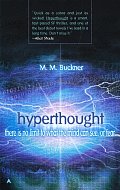Hyperthought is a head-long rush into a future where global warming and environmental catastrophe has made the surface of the earth unlivable and the equator too hot. The northern latitudes are controlled entirely by the Coms, with names like Greenland.Com and Nome.Com. (Yes, this comes across as too cute and annoying in the book as well.) The southern latitudes, what little we see of them, have a much different, more communal attitude and aren't particularly rich. The narrator, Jolie, grew up poor in the tunnels of Paris and now runs trips to the surface for rich corporate executives (I can't bring myself to call them Commies the way the book does). She falls in love with the heir to a corporate empire and then follows him into a bizarre neurological experiment in enhancing human perceptions.
This is Buckner's first novel, which I tracked down after hearing that her third novel, War Surf (in the same universe but unconnected), won the Philip K. Dick award. It's rough, with a stumble in the middle of the book, an ending that I found less interesting than the start, and a plot driver that I never much cared for. However, Buckner nails the pacing. In 177 pages, she covers ground that most SF novels would spend 300 pages exploring. The characters are into the second scene and doing things in the world by page five, and apart from a creepily weird wander through a deserted medical complex in the middle of the book, Buckner never slows down.
This is not a detailed extrapolation or a hard SF novel. It's an action-adventure with grand romance, a hissable villain, dying struggles, last-minute rescues, and dramatic dangers. Buckner never bothers to explain her world background; it's simply there, the characters start acting in it immediately, and the story drags you in and dumps you onto the scenery. And for all the fast pace, Buckner's descriptions are solid. I'm not sure I buy the mechanics of the world, but she captures the emotional impact and made me believe in how it felt to Jolie. It helps that Jolie has poor impulse control and hurls herself into new sights without taking time to think about them.
Where this book succeeds, it does so despite the core plot. The love story isn't half-bad, if cliched, but the Frankenstein brain experiments, the melodrama of the center portions, and the cliched dialog in confrontations with the villain bugged me. Hyperthought also has the flaw of attempting to capture a new level of human thought, and Buckner is way better at descriptions of the physical world and characters than she is at mental states and trascendent experiences. I mostly wanted the characters to stop spending time on the plot and get back to diving headlong through the world, which I expect wasn't the intended reaction.
I think Jolie is going to be a hit or miss narrator for readers. She's garrulous, irrepresibly outgoing (and a little shallow), and I thought a bit forced. She constantly throws out interjections in French (sort of), uses "preter" as a generic intensifier on everything, and at times she slips into long strings of simple sentences. Sometimes it works. Sometimes she won me over and I was wholeheartedly on her side. Other times, I was rolling my eyes and wishing she'd tone down the presentation and just tell the story. I give credit to Buckner for using a first-person narrator who doesn't fit the standard mold, but using one who comes across as manic and shallow is a risky maneuver that sometimes gets in the way of the story.
I wouldn't seek this one out, particularly if (as advertised) War Surf can be read independently. However, if you run across it sitting around, it's not much of an investment and I loved some of Buckner's descriptions. At under 200 pages and reading fast for that, it's a burst of action that doesn't require much of the reader.
Reviewed: 2007-04-26
